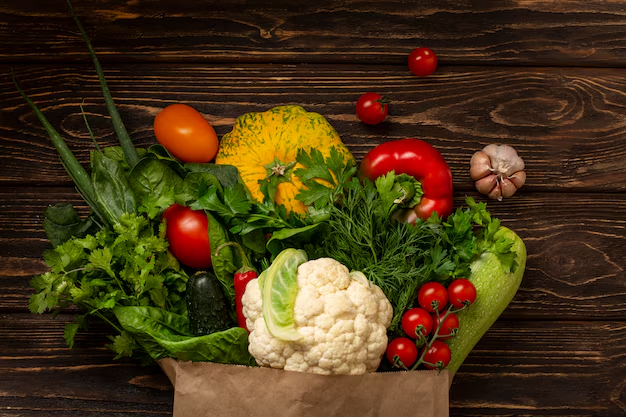The organic food industry has witnessed a huge change in popularity as individuals are becoming health conscious and are opting for organic products for their health.
But the question arises: is organic food beneficial to you?
Though many people say that organic food has shown immense benefits, nobody exactly knows whether they are good or not.
To give you a clear understanding of this, we’ll be discussing whether organic food is better for you or not in this article.
What is Organic Food?
Before we discuss Is organic food better for you? It’s important to know what exactly organic food is.
Basically, any food produced using organic farming methods that follow regulations is called organic food.
Synthetic insecticides, fertilizers, genetically modified organisms (GMOs), and antibiotics are generally not used in these methods. Instead, soil health, biodiversity, and ecological balance are prioritized in organic farming. The objective is to produce food in an ecologically responsible and sustainable manner.
The Standards and Choices in Organic Foods
It’s important to differentiate between the guidelines and procedures that set organic food apart from conventional foods while opting for them.
Below are some pointers to consider:
1. USDA Organic Label
Organic foods are stringently regulated with special regard to the country of origin; the USDA Organic label guarantees that a specific product complies with the necessary requirements.
That said, organic foods are grown using methods that avoid the use of acceptable pesticides, synthetic fertilizers, genetically modified organisms, and sewerage sludge.
In addition, the USDA Organic label assures that the standards in the production process do not harm the environment by disrupting the natural balance and diminishing the variety of species.
This label is very helpful for consumers who are interested in buying organic foods and products without any doubt about them being fake.
2. Prohibition of Synthetic Chemicals
Another significant factor in organic farming is the non-application of prohibited pesticides and herbicide products. In organic farming, pests and weeds are controlled through natural resources and eco-friendly ways.
This approach is environmentally friendly as it eliminates the use of many chemicals, thereby minimizing chemical residues in foods.
In the case of livestock like cows and pigs, organic standards prohibit the use of feed that is generated from non-organic practices, as well as ban the use of synthetic hormones and antibiotics.
In addition, these animals need to be able to go outside and be kept under conditions that allow them to act normally, which is beneficial for their health.
3. Nutritional Comparison
Perhaps the most convincing reason to consume organic food is that it is more nutritious than food produced using non–organic methods. This argument has been researched in several works, and the results are quite ambiguous.
Interestingly, certain studies have shown that organic food retains a higher quantity of certain nutrients such as vitamin C, iron, magnesium, and phosphorus than their non-organic counterparts.
Also, research has shown that organic fruits and vegetables have more antioxidants, which are useful substances that help the body fight oxidative stress and inflammation.
The meta-analysis conducted in the British Journal of Nutrition in 2014 revealed that organic crops have 18–38% more antioxidants than non-organic crops.
4. Reduced Exposure to Additives
Another notable advantage of using organically grown foods is that they shield the consumer from dangerous chemicals, such as pesticides.
By choosing organic products, consumers can limit their exposure to these chemicals, which is especially essential for vulnerable groups of the population, such as children and pregnant women.
While today’s foods are regulated and deemed safe for consumption, the effects of small doses of chemicals are worrisome, especially when taken in the long term.
5. Impact on Antibiotic Resistance
The misuse of antibiotics in agricultural and human medicine is a major contributing factor to the development of antibiotic resistance, a public health problem. Antibiotics are frequently used in conventional animal husbandry to cure illnesses and stimulate animal development.
Antibiotic-resistant bacteria may arise from this approach and infect humans through food, the environment, or direct contact.
Conversely, organic farming standards prohibit the use of antibiotics for growth promotion and only allow their use when necessary to treat sick animals.
6. Environmental and Sustainability Considerations
Organic farming is frequently praised for its advantages in the environment and sustainability and its positive effects on personal health.
Biodiversity, ecological balance, and soil health are prioritized in organic agricultural methods. To improve soil fertility and decrease erosion, these techniques include crop rotation, cover crops, and the use of organic fertilizers.
7. Alternatives to Organic Foods
Purchasing locally at farmers’ markets is a great alternative to organic food for seasonal, fresh goods. Local food is frequently picked when it is at its ripest, which can improve its flavor and nutritional content.
Supporting nearby farmers also boosts the community’s economy and lessens the environmental damage caused by long-distance food transportation.
However, ensure you wash all your fruits and vegetables before consuming them.
Organic food buying tips
Buy in season. When fruits and vegetables are in season, they are fresh and at their most affordable price. Find out when produce is delivered to your market so you can get the freshest food possible.
Shop around. Compare organic food prices at the grocery store, the farmers’ market, online, and other venues.
Bottomline
Opting for organic foods can have various health benefits. From low exposure to synthetic chemicals to environmental sustainability, choosing organic food over inorganic food can protect not only yourself but the environment as well.
So go out and get yourself some organic food, and make sure to check for the USDA organic label to ensure whether it is genuine.
Lastly, the key to good health is to adhere to a balanced and diverse diet, including organic and conventional food.
Also Read: https://usamagazineworld.com/

